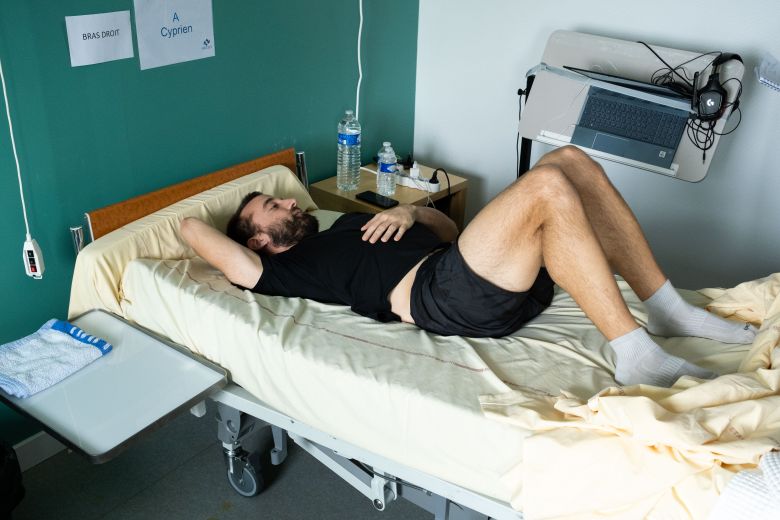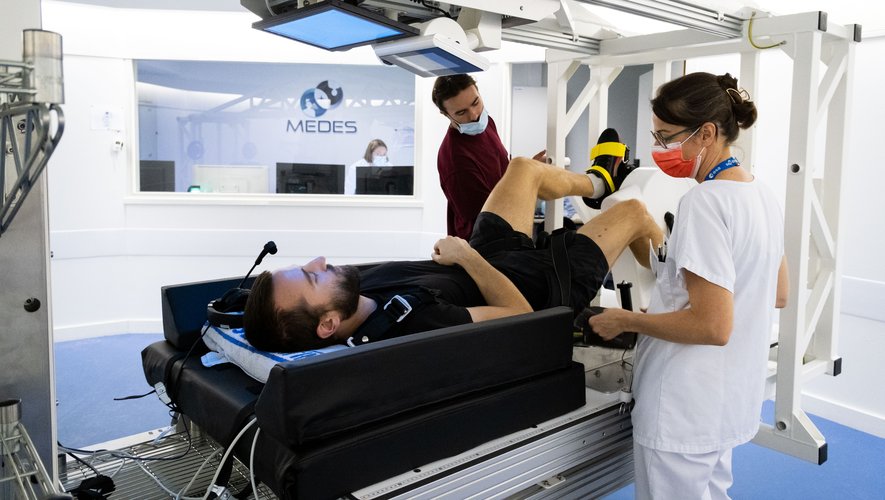The MEDES space clinic in Toulouse currently welcomes twelve volunteers. Lying down for two months, as if they were in microgravity, these men take part in a scientific study to improve human health during stays in space. Some of them perform daily cycling sessions in a centrifuge. We met one of them.
Since April 4 and until June 19, Cyprien lives lying down, his head a little lower than his feet, in a bed inclined at -6°. This 35-year-old man is one of 12 volunteers recruited for the BRACE study (Bed Rest with Artificial gravity and Cycling Exercise) conducted by the MEDES space clinic in Toulouse.
At the request of the European Space Agency (ESA) and CNES (National Center for Space Studies), this scientific experiment seeks to assess whether an artificial gravity system can prevent and/or reduce the deleterious effects of microgravity such as the one astronauts experience. Because stays in space cause in particular a loss of bone density, muscle mass, a modification of cardiovascular functions and the morphology of the eye.
Passionate about space since childhood
In the BRACE experiment, the goal is to evaluate the benefits of physical exercise in artificial gravity. This is generated by a centrifuge consisting of two arms. Four of the twelve volunteers, drawn by lot, settle there every day to do thirty minutes of cycling in a lying position.
This is the case of Cyprien, the first volunteer integrated into the study. We met him at his 44e day of bed rest, relaxed and really happy to be part of the adventure. “Space research has fascinated me since my childhood. It is rewarding to contribute to studies that could be of use to astronauts but also to health on Earth”, he explains, adding that the remuneration (€18,000 paid in four years) was not his first motivation, “I would have done it for less than that”.
Read also :
Ready to spend 60 days in an inclined bed? Come and advance space research in Toulouse
More than twice its weight in the feet
Recruited on the basis of good physical and mental health, Cyprien is used to hard work. Practicing running, he does between 70 km and 80 km per week in the region of the Arcachon basin where he lives. But for two months, it is lying and attached to a bicycle, in a centrifuge, that this former air force logistician does sports. “The spinner is actually quite nice. I don’t feel like I’m spinning. When accelerating, you feel like you have more downforce, like you’re heavier on the saddle . But the physical effort is intense, a bit like a split session in running”, testifies the volunteer who receives, according to his personalized program, between 1.2G and 1.4G at the level of the navel and between 2.4G and 2.7G at the feet.
Helmet on the ears to communicate with the medical team, blood pressure cuff on the arm, electrodes on the chest and sensor at the end of the finger to measure the oxygen saturation, Cyprien is ready for 30 minutes of effort. Very focused on his performance, he practices his session without too much dialogue, focusing on his pedaling frequency.

For the purposes of the study, the volunteers, like Cyprien, are bedridden for two months with an inclination of -6 degrees to reproduce the effects of an absence of gravity.
If he did not know how he was going to collect the sequence of sessions, Cyprien is relieved to have been drawn from the group of “athletes” (4 volunteers do cycling sessions, 4 volunteers cycle in the centrifuge and 4 volunteers do nothing). “I knew that when I entered the study, I was going to lose muscle mass and that I would come out in poorer physical shape, I also felt pain in my lower back for a week. But I know also that we can recover well, like astronauts, and that we are well followed”.
Twelve other volunteers will be recruited from September for the second part of the BRACE study which will take place at the beginning of 2024.

